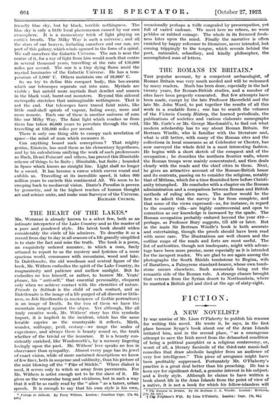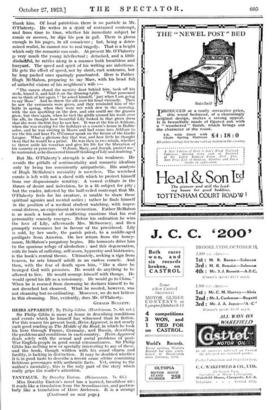FICTION.
A NEW NOVELIST.t
IT was unwise of Mr. Liam O'Flaherty to publish his reasons for writing this novel. He wrote it, he says, in the first place because Synge's book about one of the Aran Islands irritated him, and in the second place, " as a courageous attempt to save the Irish novel from the debauched condition of being a political pamphlet or a religious controversy, or, worst of all, a literary facsimile of the third-rate music-hall comedies that draw alcoholic laughter from an audience of very low intelligence." This piece of arrogance might have been profitably suppressed. Fortunately Mr. O'Flaherty's practice is a great deal better than his preaching. He has a keen eye for significant detail, a genuine interest in his subject, and a lively style. Although he claims to have written a book about life in the Aran Islands from the point of view of a native, it is not a book for which his fellow-islanders will • The Romans in .Britain. By Sir Bertram C. A. Windle. London : Methuen, [12s. 6d. net.] t Thy Neighbour's Wife. By Liam OTlaherty. London Cape. [7s, 6d.1 thank him. Of local patriotism there is no particle in Mr. O'Flaherty. He writes in a spirit of restrained contempt, and from time to time, whether his immediate subject be comic or morose, he dips his pen in gall. There is gloom enough in his pages, in all conscience ; but, being a deter- mined realist, he cannot rise to real tragedy. That is a height which only the romantic can scale. At present Mr. O'Flaherty is very much the young intellectual ; detached, and a little disdailtftd, he rattles along in a manner both breathless and buoyant. The speed and spirit of his writing are infectious. He gets the effect of speed, not by short, curt sentences, but
by long packed ones sparingly punctuated. Here is Father Hugh McMahon, preparing to say Mass, with his head full of unlawful visions of his neighbour's wife :—
" The curate closed the sacristy door behind him, took off his stole, kissed it, and laid it on the dressing-table. ' What possessed me to think of her again ? ' he asked himself, just when I am going to say Mass.' And he threw the alb over his head viciously. Then he saw the vestments were green, and they reminded him of the fields in spring, when they were wet with dew in the morning, with the sun sparkling on the dew, and one could see the grasses grow, but then again, when he tied the girdle around his waist over the alb, he thought how beautiful Lily looked in that green dress that she wore the first day he saw her. It was at the feis at Athlone, when she was staying for the holidays at a cousin's house in Ballin- asloe, and he was visiting in Moate and had come into Athlone to see the feis and hear Fr. O'Connor speak on the future of the Gaelic League. What a glorious day that was, and how little he thought then that he would be a priest. He was then in two minds, whether to throw aside his vocation and give his life for the liberation of his country or persevere. ' 0 Jesus, Mary, and Joseph, protect me,' he murmured, as he discovered himself thinking of Lily and doubting."
But Mr. O'Flaherty's strength is also his weakness. He avoids the pitfalls of sentimentality and romantic idealism only by being too consistently antipathetic. His analysis of Hugh McMahon's mentality is merciless. The wretched curate is left with not a shred with which to protect himself from our dispassionate scrutiny. A vowed celibate in the throes of desire and indecision, he is a fit subject for pity ; but the reader, infected by the half-veiled contempt that Mr. O'Flaherty feels for his creature, is unable to share these spiritual agonies and mental antics ; rather he finds himself in the position of a medical student watching, with imper- sonal distress, an experiment in vivisection. Father McMahon is so much a bundle of conflicting emotions that his real personality scarcely emerges. Before his ordination he wins the love of Lily, afterwards Mrs. McSweeney, and then promptly renounces her in favour of the priesthood. Lily is sold, by her uncle, the parish priest, to a middle-aged profligate from America. On her return from the honey- moon, McMahon's purgatory begins. His torments drive him to the spurious refuge of alcoholism ; and this degeneration, with its train of suffering, self-scorn, hypocrisy and histrionics, is the book's central theme. Ultimately, seeking a sign from heaven, he sets himself adrift in an oarless coracle. And then, with the fear of death upon him, " like a slave he besieged God with promises. He would do anything to be allowed to live. He would scourge himself with thongs. He would spend his life as a missionary. He would go to China." When he is rescued from drowning he declares himself to be not drenched but cleansed. What he needed, however, was not cleansing but co-ordinating. Moreover, we do not believe in this cleansing. Nor, evidently, does Mr. O'Flaherty.
GERALD BULLETT.















































 Previous page
Previous page